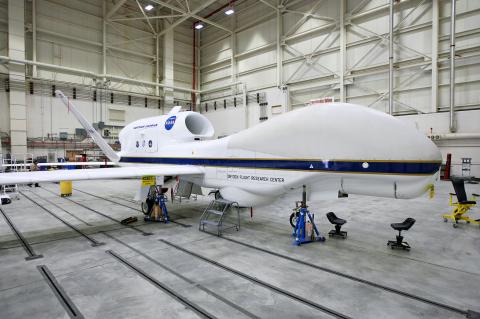The US government on Tuesday established a policy for exports of military and commercial drones, including armed ones, and said it plans to work with other countries to shape global standards for the use of the controversial weapons systems.
The US Department of State said it would allow exports of lethal US military drones under strict conditions, including that sales must be made through government programs and that recipient nations must agree to certain “end-use assurances.”
The policy, the details of which are classified, comes after a two-year review amid growing demand from US allies for the new breed of weapons that have played a key role in US military action in Afghanistan, Iraq and Yemen.

Photo: AFP
It could help US companies boost sales of military and commercial drones in an increasingly competitive global market.
Privately held General Atomics, maker of the Predator and Reaper drones, Northrop Grumman Corp, Textron and other arms makers have been urging Washington for years to loosen strict export curbs, which they say have caused them to lose orders to Israel and others in the growing market.
Ideally, the policy would help industry better understand the current complex review process for drone exports, said Remy Nathan, vice president of the Aerospace Industries Association.
He said the association had asked for a classified briefing on the policy.
The shift came just days after US aviation regulators proposed rules that would lift some restrictions on drone use for commercial purposes, but would still limit activities such as inspections of pipelines.
The change also follows stern warnings by top US officials about rapid advances in weapons technology by China, Russia and other potential foes, including unmanned systems.
China has its own ambitious drone program and has exported drones to at least nine countries, including Pakistan, Egypt and the United Arab Emirates, while it is also in talks with Saudi Arabia and Algeria for sales, according to Chinese state media.
The new policy will make it easier for the US’ closest allies to buy armed drones, while maintaining stringent controls on the overall technology, US officials said.
Britain is the only country now flying armed US drones, but France and Italy fly Reaper surveillance drones.
A State Department official said that previous requests for armed drones from Italy and Turkey would be reviewed in light of the new policy.
The policy maintains “a strong presumption of denial” of sales of the biggest drones, so-called Category I aircraft that have a range of at least 300km and can carry a payload of at least 500kg, but will allow such exports on “rare occasions.”
The official said there was no formal list of countries that would be eligible for exports of armed drones, and all requests would be evaluated on a case-by-case basis, with consideration of human rights, regional power balance and other factors.
The Philippines, which is embroiled in a bitter dispute with China over South China Sea boundaries, would be interested in drones that could be used for intelligence and surveillance operations, military spokesman Colonel Restituto Padilla said.
It did not want armed drones, he added.
Sales of armed drones could boost Lockheed Martin Corp, which builds Hellfire missiles that are used by Predator and Reaper drones, but could also help companies like L-3 Communications Holdings and Raytheon Co, which build sensors and simulators for the unmanned systems.
“The new policy ensures appropriate participation for US industry in the emerging commercial UAS market, which will contribute to the health of the US industrial base, and thus to US national security, which includes economic security,” the State Department official said.
Under the policy, buyers of military drones will have to agree to strict conditions, including adherence to international law, and a ban on using the drones for unlawful surveillance or to crack down on their domestic populations.

A car bomb killed a senior Russian general in southern Moscow yesterday morning, the latest high-profile army figure to be blown up in a blast that came just hours after Russian and Ukrainian delegates held separate talks in Miami on a plan to end the war. Kyiv has not commented on the incident, but Russian investigators said they were probing whether the blast was “linked” to “Ukrainian special forces.” The attack was similar to other assassinations of generals and pro-war figures that have either been claimed, or are widely believed to have been orchestrated, by Ukraine. Russian Lieutenant General Fanil Sarvarov, 56, head

SAFETY FIRST: Double the number of police were deployed at the Taipei Marathon, while other cities released plans to bolster public event safety Authorities across Taiwan have stepped up security measures ahead of Christmas and New Year events, following a knife and smoke bomb attack in Taipei on Friday that left four people dead and 11 injured. In a bid to prevent potential copycat incidents, police deployments have been expanded for large gatherings, transport hubs, and other crowded public spaces, according to official statements from police and city authorities. Taipei Mayor Chiang Wan-an (蔣萬安) said the city has “comprehensively raised security readiness” in crowded areas, increased police deployments with armed officers, and intensified patrols during weekends and nighttime hours. For large-scale events, security checkpoints and explosives

‘POLITICAL GAME’: DPP lawmakers said the motion would not meet the legislative threshold needed, and accused the KMT and the TPP of trivializing the Constitution The Legislative Yuan yesterday approved a motion to initiate impeachment proceedings against President William Lai (賴清德), saying he had undermined Taiwan’s constitutional order and democracy. The motion was approved 61-50 by lawmakers from the main opposition Chinese Nationalist Party (KMT) and the smaller Taiwan People’s Party (TPP), who together hold a legislative majority. Under the motion, a roll call vote for impeachment would be held on May 19 next year, after various hearings are held and Lai is given the chance to defend himself. The move came after Lai on Monday last week did not promulgate an amendment passed by the legislature that

PENTAGON ASSESSMENT: A US report said that even as China and Russia deepen their partnership, cooperation is hindered by a ‘mutual distrust’ of each other The Chinese People’s Liberation Army (PLA) as of October had doubled the number of ships and airplanes deployed around Taiwan compared with the previous two years, Vice Minister of National Defense Hsu Szu-chien (徐斯儉) said yesterday, a day after the opposition-controlled legislature voted against reviewing the government’s general budget for next year, including a NT$1.25 trillion (US$39.71 billion) special defense spending bill. The legislature’s vote against the Ministry of National Defense’s spending plans was regrettable, as the budget was designed to respond to the developing Chinese military threat, Hsu said on the sidelines of a legislative meeting on the general budget. Defense